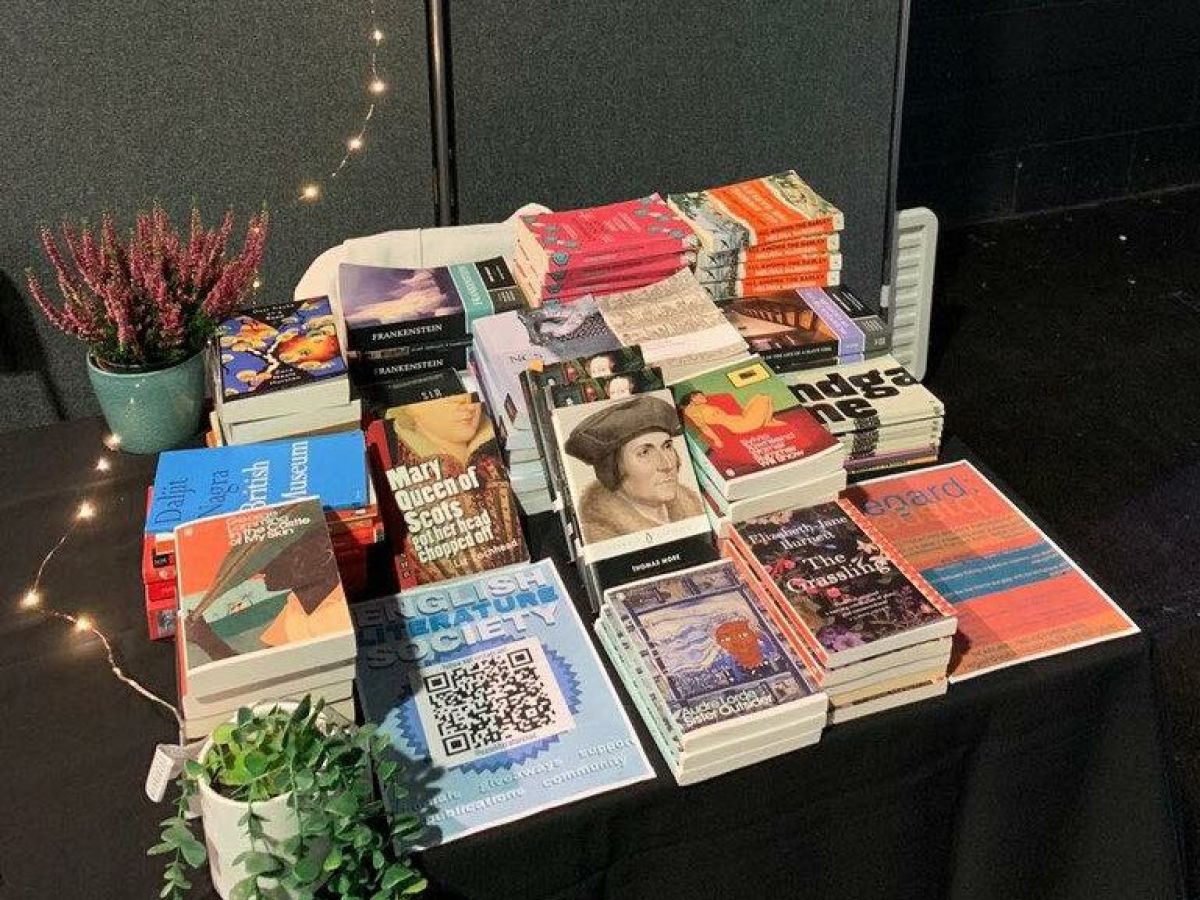In conversation with English Lit Soc: “The words are the same on the page, but everyone interacts with it differently”
By Megan Bailey

Now that we’re settled back into university life, it’s safe to say that it’s the perfect time to start looking at societies again. I chatted with Emeline Forton, co-editor of the English Literature Society, to discuss what this year’s committee plans have to offer students this year.
Emeline first gave a brief overview of the society. “The society was sort of void, and so I think the [English] department really noticed that there wasn’t that community of students,” she explained. “We came back from the summer holidays determined to get the society up and running and just want a collaborative, encouraging, sociable space for English literature students. Also for students who love literature but don’t necessarily study it as well, we want to make it as accessible as possible for all students and that’s one of the initiatives that we’ve probably implemented the best so far.”
Emeline detailed this year’s Freshers’ Fair, where old coursebooks were given away. This was a huge success. “All of the first-year English books were taken by the end of the Freshers Fair! It was a real affirmation for us that what we were doing was popular and we took that as a green light to just keep on going with it.”
The inclusivity of other subjects and students on different courses was an interesting point – I discussed with Emeline the broader range of students who had joined our books section this year, students within the science faculty and departments which you might not usually expect to be as enthusiastic about books. I asked why English Literature can benefit everyone, and how she might describe how creative mediums are able to bring people together so strongly.
Emeline agreed on this wider bonding over books, saying, “I think that’s reflected really nicely in our committee as well.” Amongst the team at the English Literature Society, there is a range of year groups involved as well as studies, especially English joint honours students. Emeline herself studies English Literature and German, and she feels that these interests in the German language and linguistic elements bring a different depth to her experiences.
“I want to encourage that sort of atmosphere of intertextuality and interdisciplinary studies in the society because you can only profit from learning and exploring different specialities and viewpoints.”
In terms of socials, the society first hosted one at Haus, Fallowfield. The event was another credit to the committee, with students immediately being eager for news about the next. Emeline says that they are focused on collaborating with other societies as a way to branch out, but also as a way to play on age-old competitions between certain subjects.
“We’re in conversation with drama, the book club society, even the maths society. We want to have that interesting juxtaposition between English and maths and actually have a really united sort of approach on things. I think that’s so funny, the age of English/Maths rivalry – we want to play with that and encourage trying something new.”
When it comes to anxiety surrounding social events, Emeline and I agreed that as intimidating as it may be, pushing yourself out of your comfort zone is often the best way to go. “There’s no one gold rule of advice or one thing you have to do,” she said, “but out of ten people in one room, there’s always going to be at least one person that you have something in common with.”
This rings true for a wider context in life – especially for all introverts out there. It is a daunting thought for many to show up to a society event for the first time. Often, we convince a friend to come along, and even then tend to stick with that familiar and safe face in the corner for hours. But, as Emeline described it, there will always be at least one person you can form meaningful and amicable relationships with.
And if not for the promise of new friendships, do it for the giveaways! The English Literature Society gave away a £25 Blackwell’s book card at their first social, so really – there’s nothing to lose but plenty to miss out on.
We also discussed reading for pleasure at university: “There is diversity in English students; it’s not all dark academia and sitting by the fire.”
Emeline’s philosophy is that any experience with a text is worthwhile and will encourage personal growth in some way. She discussed the pressure to read something ‘high-brow’ to benefit your studies, but that reading is important for your mental health too, so what you are engaging with matters most when you enjoy doing it. For Emeline, Purple Hibiscus by Chimamanda Ngozi Adichie had a profound impact.
“I think that was incredible and I got all my family members to read it. I really resonated with the narration, and there’s something about girlhood being presented in novels that makes me so emotional. I think all of Adichie’s work is that we should all be feminists, I would recommend anything from her. It’s a really good introductory text.”
Being that Purple Hibiscus was one of the first books Emeline read at university, she pointed out that authors you’re introduced to through your course can then become life-long favourites of yours, and that you shouldn’t limit yourself to one of their texts when you might discover much more in their other works too.
That Emeline mentioned encouraging her family to read Adichie reinforces the unifying nature of not only literature, but art form as a whole. These mediums of creativity become a vessel for so many, a love language, even. When you recommend a book to someone, it’s because you know that person and you know that a particular novel or poem will speak to them. Even though it is someone else’s words, it sometimes feels like it is opening up parts of yourself, which can be a vulnerable thing to share with even those you love. Emeline agreed with this perspective, calling the entire experience at its core personal.
Being part of the Society has taught Emeline a great deal of things. Yet she shared that one of the main things she feels she has learned is that everyone works and reads at different rates and that we all have such different experiences with the same texts.
“The words are the same on the page, but everyone interacts with it differently. So, to have this kind of cookie cutter expectation that you’re going to take the same thing away from a book or a committee meeting or whatever it is – it’s never like that.”
Emeline’s clear passion for both Literature and the well-being of students not only serves to inspire her peers, but extends into a physical sense. We talked about which article she would write for our books section if she were to write a piece for the Mancunion, to which she responded, “I think I would want to talk about Manchester’s literary history.”
For anyone who doesn’t know, Emeline, alongside her co-editor Theo Abbott, has founded an English Literature Society publication called Regard, this year.
“Our unique selling point is that we want it to engage with the old and with the new. Our issue title, Balance, is a thematically organised issue and we want to encourage a really conversational tone that uses Balances as a thematic umbrella for all of the interesting discussion points available to students regarding pre-existing literary history, specifically in Manchester.”
Emeline described her excitement to read through all of the entries, with the submission deadline having closed on October 11, 2023, as well as how proud she is of all that they have done so far.
“It’s so cool to see how people interpret a word, balance, and draw in the rich literary history of Manchester, but also their own personal experiences in a conversational tone that doesn’t have real limits on what we want to discuss. To submit to it, it doesn’t have to be academically marked by the University, so it’s a bit more accessible because we encourage fiction, non-fiction, course reflections, poetry, and so on. The only requirement is that it interacted with the theme of Balance in some way. It’s been really great so far. I’m really excited to get that out to the public.”
Speaking with Emeline on behalf of the English Literature Society was such a pleasure, and her enthusiasm really speaks to students who feel that they want more of a community both within and beyond their studies. The committee as a whole really is a credit to the department, and their dedication to both providing fun activities for its members, as well as opportunities to write their own pieces for the newly founded Balance, sets an exciting precedent for the year ahead.







